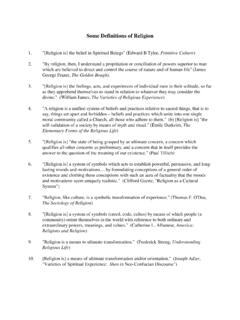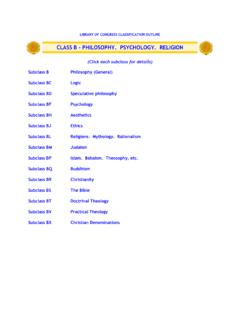Transcription of The Role of Religion in Today’s Conflict
1 The Role of Religion in Today s Ms. Karen Armstrong As we are all agreed, the Conflict between the Muslim world and the West is essentially political but on a popular level Religion is seen as one of its root causes. Islam is regarded in the West as an essentially violent faith that impels worshippers to acts of terror and on the Muslim side claim to be inspired wholly by the Qur an and the Shari ah. Secularists sometimes regard all Religion as essentially divisive and obscurantist. There is a symbiotic relationship between Religion and contemporary politics: each influences and exacerbates each other. It is, therefore, essential that our report looks at this dimension of the current impasse, dispels misapprehensions, gives an accurate appraisal of the precise role of Religion in the current crisis, and makes some practical recommendations for the future.
2 First, it is important to make it clear that none of the so-called world religions condones or encourages killing. My recent studies show that at their inception, they were all rooted in a disciplined rejection of violence. All promote the ideals of compassion, justice and respect for the sacred rights of the individual. This is no less true of Islam than of Judaism, Christianity, Buddhism, Hinduism, Jainism, Confucianism or Daoism. It is true, however, that all these faiths first developed in periods of great violence and that their scriptures often bear the marks of the warfare and aggression of their time. We see this clearly in the Jewish Scriptures, the New Testament and the Qur an, which all contain passages that can and have been used by extremists to justify violence and intolerance.
3 Historically it can be observed that when warfare becomes endemic in a region, Religion gets, as it were, sucked into the Conflict and becomes part of the problem. This was certainly the case in eleventh century Europe at the time of the First Crusade, and it has happened in the Middle East or Afghanistan in our own time. When warfare becomes chronic and violence an everyday occurrence, this affects people s dreams, fantasies, ambitions, relationships, and can also affect their Religion ~ especially if people lose hope in the ordinary political process and think that they have nothing to lose. Modernity has privileged some at the expense of others; from the very beginning, people were victimized by the modernization of their region: the African slaves, the Native Americans, the Jews of Europe and the colonized peoples have all been casualties of modernity.
4 Some of the traditionally devout have also felt violated by a secularism that seems inimical and even lethal their faith. The transition from a pre-modern to a modernized society and economy is painful. In Europe the process, which lasted from the sixteenth to the nineteenth centuries, was punctuated by bloody revolutions succeeded by reigns of terror, dictatorships, wars of Religion , and alienation in the newly industrialized cities. In the United States, Protestants created the first 1 This analysis and set of recommendations were submitted on 7 June 2006. 1fundamentalist movement at the time of World War I in order to protect Christianity, which, they felt, was imperilled by the new ideas and institutions.
5 In some of the colonized countries, however, the process has been even more traumatic because it has been far too rapid. Secularization has often been experienced as an assault. It has also created a division between a Western-educated elite and the majority who feel bewildered by the new secular institutions. Thus Religion has become embattled and even militant. In the middle of the twentieth century, it was widely assumed that secularism was the coming ideology and that Religion would never again play a major role in world events. But in almost every single one of the major world religions ~ in Judaism, Christianity, Islam, Hinduism, Sikhism, Buddhism and Confucianism, ~ an aggressive piety, that is deeply political, has challenged this assumption, determined to drag God/ Religion from the sidelines to which they have been relegated in modern secular society and back to centre In almost every region where a secularized society, separating Religion and politics, has been established a religious counter-cultural movement has sprung up alongside it in conscious rejection, displaying a widespread disappointment with modernity.
6 Whatever the pundits, politicians and intellectuals claim, people all over the world have demonstrated that they want to see Religion represented more fully in public life. These fundamentalist movements are by no means always violent, however. Most fundamentalists simply try to live what they consider a good religious life in a world that seems increasingly hostile to faith and their counteroffensive against the mainstream is peaceable. Only a tiny proportion of fundamentalists worldwide take part in acts of terror. There is a potential for violence, however. Every single one of the fundamentalisms that I have studied in Judaism, Christianity and Islam is rooted in a profound fear of annihilation, convinced that modern society wants to wipe out true faith.
7 This visceral dread of extermination can be clearly seen in the ideologies and mythologies created by these groups, which are often aggressively nihilistic and apocalyptic (See the Rapture mythology of the Christian Right in the United States; the messianic eschatology of the religious Zionists in Israel; the primitive eschatology of some Islamists). Fundamentalists believe that they are fighting for survival and when people feel that their backs are to the wall in this way, they can lash out violently. It is a mistake to view a fundamentalism as typical of the tradition; fundamentalisms are innovative movements; even though they claim to represent the faith, they are in fact unorthodox ~ even anti-orthodox. They are promoting new doctrines: the Protestant Fundamentalists emphasis on the literal infallibility of scripture is a wholly new development; they are reading 2 We should note that, thought it is hard to find a substitute, the term fundamentalism is unsatisfactory; it was coined by Protestant reformers in the United States, who wanted to return to what they regarded as the fundamentals of Christianity.
8 But the term does not apply satisfactorily to other rejectionist movements 2their scriptures in an entirely modern way, as is the centrality given to jihad, meaning holy war , by some Islamists. The fear and defensiveness of these groups means that they often distort the very faith that they are trying to preserve, emphasizing the belligerent aspects of the tradition and downplaying those that speak of compassion and benevolence. But at the same time, this militant piety has put Religion back on the map. It has become a powerful vehicle for dissent and these ideologies should not be dismissed as risible. Many of these groups have considerable political influence. The Christian Right, for example, has a strong influence on the current administration.
9 In some regions ~ the United States, Israel and parts of the Muslim world ~ society has become dangerously polarized. There is a gulf between those who appreciate modernization and those who express their alienation from secularized society in a religious counter-narrative. They find it increasingly difficult to understand each other. Fundamentalism sometimes takes the form of religious patriotism, replacing the 19th century European model of nationalism with one based on Religion . This is very clear among the Religious Right in the United States and among the Religious Zionists in Israel. In the Muslim world, where Western secular nationalism was a foreign import, this religious national identity is regarded as a restoration of integrity, a return to the state of affairs that existed before the colonial disruption.
10 By the end of the twentieth century, it was clear that in all three of the monotheistic faiths, the fear of some of these fundamentalist groups was hardening into righteous rage. The history of Jewish, Christian and Muslim fundamentalism shows that it usually begins with what is perceived to be an assault by the secularizing or liberalizing sectors of society. There is a strong sense of humiliation. Certain issues become symbols of everything that is wrong with the modern world. Examples are the issues of abortion, evolution and homosexuality in Christian fundamentalism; the secular state of Israel and the dispossession of the Palestinians have become symbolic issues in many forms of Jewish and Muslim fundamentalism. This makes rational discussion of these topics well-nigh impossible.









